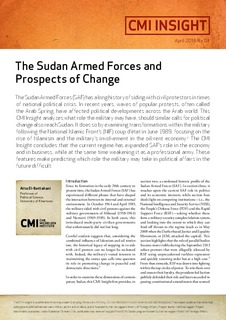| dc.contributor.author | El-Battahani, Atta | |
| dc.date.accessioned | 2018-01-04T08:23:51Z | |
| dc.date.available | 2018-01-04T08:23:51Z | |
| dc.date.issued | 2016-04-01 | |
| dc.identifier | oai:www.cmi.no:5790 | |
| dc.identifier.citation | Bergen: Chr. Michelsen Institute (CMI Insight no. 2016:3) 9 p. | |
| dc.identifier.issn | 0809-6732 | |
| dc.identifier.uri | http://hdl.handle.net/11250/2475454 | |
| dc.description.abstract | The Sudan Armed Forces (SAF) has a long history of siding with civil protestors in times of national political crisis. In recent years, waves of popular protests, often called the Arab Spring, have affected political developments across the Arab world. This CMI Insight analyzes what role the military may have, should similar calls for political change also reach Sudan. It does so by examining transformations within the military following the National Islamic Front’s (NIF) coup d’état in June 1989, focusing on the rise of Islamism and the military’s involvement in the oil-rent economy. 1 The CMI Insight concludes that the current regime has expanded SAF’s role in the economy and in business, while at the same time weakening it as a professional army. These features make predicting which role the military may take in political affairs in the future difficult. | |
| dc.language.iso | eng | |
| dc.publisher | Chr. Michelsen Institute | |
| dc.relation | CMI Insight | |
| dc.relation | 2016:3 | |
| dc.relation.ispartof | CMI Insight | |
| dc.relation.ispartofseries | CMI Insight 2016:3 | |
| dc.relation.uri | https://www.cmi.no/publications/5790-the-sudan-armed-forces-and-prospects-of-change | |
| dc.subject | Sudan | |
| dc.subject | Sudan Armed Forces | |
| dc.subject | Arab Spring | |
| dc.subject | Military | |
| dc.title | The Sudan Armed Forces and Prospects of Change | |
| dc.type | Report | |
